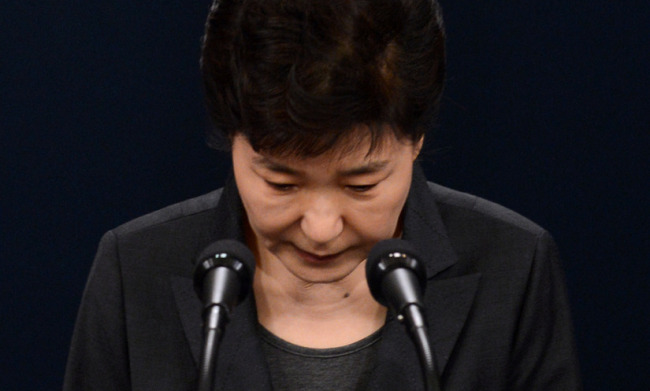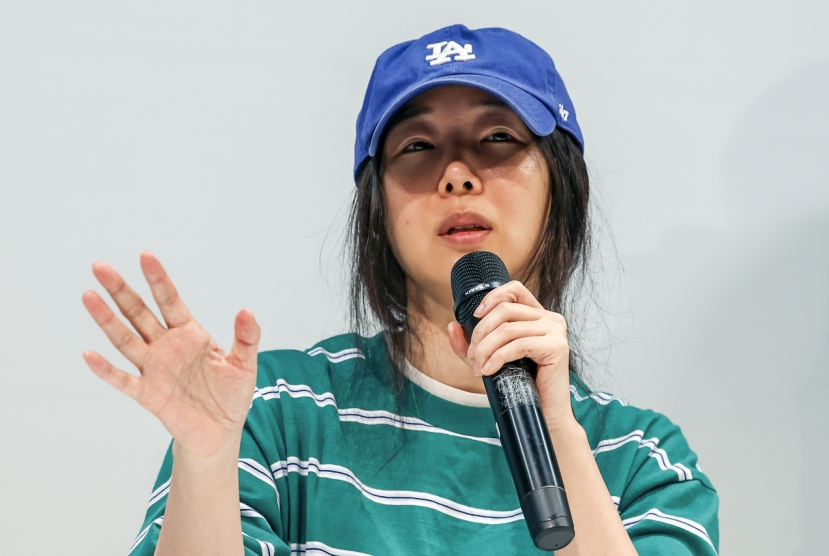Park chooses investigation over resignation
President denies shamanistic influence from Choi Soon-sil
By Korea HeraldPublished : Nov. 4, 2016 - 18:25
President Park Geun-hye’s consent to receive prosecutorial questioning over the snowballing corruption scandal involving her confidante Choi Soon-sil was considered the least damaging scenario for the troubled state leader, as her resignation and legal sanctions are increasingly being sought.
While appearing to embrace calls to ascertain the truth, Park’s agreement to cooperate with the prosecution’s probe signaled she would not step down from power.
She also denied having known about Choi’s extensive influence and illicit profiteering, only admitting to what she described as a betrayal of trust from a longtime friend.
“I feel sorry and miserable that a specific individual derived benefits in the process of key state projects which were meant to improve the nation’s economy and the people’s lives,” Park said Friday in an address broadcast live to the nation.
While appearing to embrace calls to ascertain the truth, Park’s agreement to cooperate with the prosecution’s probe signaled she would not step down from power.
She also denied having known about Choi’s extensive influence and illicit profiteering, only admitting to what she described as a betrayal of trust from a longtime friend.
“I feel sorry and miserable that a specific individual derived benefits in the process of key state projects which were meant to improve the nation’s economy and the people’s lives,” Park said Friday in an address broadcast live to the nation.

This was the second “apology” to come from the president since a series of reports early last week revealed circumstantial evidence showing Choi had long meddled in key state affairs.
Though she claimed to be “deeply responsible” for the current circumstances, Park sidestepped criticism she failed in her duty as the state’s control tower.
“The prosecution should hence stand free from all (constraints) and reveal the truth, on which strict judicial measures are to be taken,” Park said.
She also referred to the prosecutors’ recent detention of Choi and the arrest of former Senior Presidential Secretary for Policy Coordination An Chong-bum as part of a “thorough and prompt” investigation. An, who has long been one of the most trusted advisers to Park, recently claimed during questioning that he had contacted Choi only under direct orders from the president.
Park’s detached tone was clearly distinguished from her earlier silence, which implied an apparent refusal to recognize the wrongdoings of her aides which could, in turn, lead to her own liability.
The state chief’s acceptance to be questioned, making for the first case in South Korea’s political history of an incumbent president facing prosecutorial scrutiny, followed remarks by key officials the president should not be exempt from fact-finding procedures.
“My answer is that all people, including the president, are equal before the law,” said prime minister nominee Kim Byong-joon on Thursday in a press briefing.
Justice Minister Kim Hyun-woong also said during a parliamentary committee meeting that he would suggest to the president that she respond to prosecutorial calls for questioning.
Facing an imminent probe, Park once again elaborated on her relationship with the scandal-ridden Choi.
“Since I came to Cheong Wa Dae, I have severed ties with those around me, including family members, lest disreputable situations should occur,” she said in a trembling voice.
“Having nobody to assist me with my personal affairs, I came to seek help from my longtime acquaintance Choi.”
Her explanation, however, was contradicted by her estranged siblings -- younger sister Geun-ryeong and brother Ji-man, who have long held grudges against Choi and her late father Choi Tae-min. The two younger Parks had even filed a petition demanding their elder sister be “freed” from the elder Choi’s influence in 1990.
“Because (Choi Soon-sil) stood by my side through my hardest times, it is true that in spite of myself, I lowered my guard,” Park said, claiming to be a victim to Choi’s betrayal of trust.
The president also denied rumors she had taken up a shamanist cult or religion, seemingly distancing herself from Choi, who is the daughter of the late cult leader Choi Tae-min.
“It is only suitable that I should offer explanations about what happened, but with the prosecutorial probe ongoing, I find it inappropriate to describe details on the case,” Park added.
She then urged the government to resume its functions so as to prevent a vacuum in state affairs, especially in the areas of national security and the economy.
Though she did not mention the recent series of staff reshuffling, the president’s call for government normalization was taken as a message to the opposition to stop their protest and cooperate with the incoming Cabinet.
The opposition, which had been demanding a fundamentally renewed Cabinet under the leadership of an impartial prime minister, has been filing complaints over the hurried and covert way in which Park reshuffled key officials.
By Bae Hyun-jung / (tellme@heraldcorp.com)
-
Articles by Korea Herald





![[Herald Interview] 'Amid aging population, Korea to invite more young professionals from overseas'](http://res.heraldm.com/phpwas/restmb_idxmake.php?idx=644&simg=/content/image/2024/04/24/20240424050844_0.jpg&u=20240424200058)












![[KH Explains] Korean shipbuilding stocks rally: Real growth or bubble?](http://res.heraldm.com/phpwas/restmb_idxmake.php?idx=652&simg=/content/image/2024/04/25/20240425050656_0.jpg&u=)

